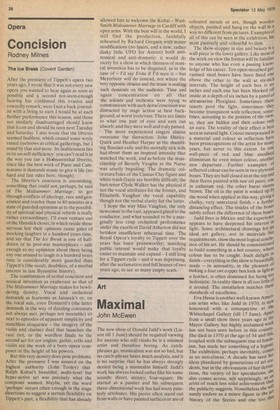Concision
Rodney Milnes
The Ice Break (Covent Garden) After the premiere of Tippett's opera two years ago, I wrote that it was not every new opera you wanted to hear again as soon as possible and a second not-soon-enough hearing has confirmed this evasive and cowardly remark; were I not a hack journalist with a living to earn I would be at each further performance this season, and those not similarly disadvantaged should know that it can and should be seen next Tuesday and Saturday. I also wrote that the libretto seemed faultless, which caused some wryly raised eyebrows at critical gatherings, but I stand by that and more. Its faultlessness lies in its un-self-sufficiency: you can't read it in the way you can a Hofmannsthal libretto, since like the best work of Piave and Cammarano it demands music to give it life (no hard and fast rules here, though).
The libretto's concision is astonishing, something that could not, perhaps, be said of The Midsummer Marriage; to get through conflicts of ideology, race and generation and resolve them in 80 minutes in a state of guarded optimism as to the possibility of spiritual and physical rebirth is really rather extraordinary. I'll even venture out of the Hanslick'closet, in which reside those nervous lest their opinions cause gales of mocking laughter in a hundred years time, and say that The Ice Break is one of halfdozen or so post-war masterpieces — safe enough as my optimism about there being any one around to laugh in a hundred years time is considerably more guarded than Tippett's (the result, doubtless, of a morbid interest in late Byzantine history).
The combination of verbal concision and musical invention as exuberant as that of The Midsummer Marriage makes for bewildering density. Vocal and orchestral demands as fearsome as Janacek's or, on the vocal side, even Donizetti's (the latter demands in the way of dazzling coloratura not always met, perhaps not meetable) sit next to episodes of apparent simplicity and matchless eloquence — the imagery of the violin and clarinet duel that launches the race riot, or the wordless finale to the second act for cor anglais, guitar, cello and violin are the work of' a born opera composer at the height of his powers.
But this very density does pose problems. After the premiere I was assured on the highest authority (John Tooley) that Ralph Koltai's beautiful, multi-level but hyper-active set was precisely what the composer wanted. Maybe, yet the word 'perhaps' occurs often enough in the stage directions to suggest a certain flexibility on Tippett's part, a flexibility that has already allowed him to welcome the Koltai — WattSmith Midsummer Marriage in Cardiff with open arms. With the best will in the world, still find the production, faithfully rehearsed by Richard Gregson with minor modifications (no lasers, and a new, rather dinky little UFO for Astron) both antimusical and anti-dramatic: it would do nicely for a show in which thinness of musical invention has to be disguised, as in the case of — I'd say Evita if I'd seen it — but Meyerbeer will do instead, not where the very opposite obtains and the music is makigg such demands on the audience. Time and again concentration on all that the soloists and orchestra were trying to communicate with such dense-concision was distracted by stage "action at best background, at worst irrelevant. There are limits to what one pair of eyes and ears can absorb, and they were well and truly passed.
The more experienced singers' almost overcame the distraction. John ShirleyQuirk and Heather Harper as the shambling Russian exile and his mortally sick wife had about them an inspired intensity that matched the work, and as before the musicianship of Beverly Vaughn as the Nurse was utterly beguiling. The dramatic coloratura toles of the Cassius Clay figure and white-trash Gayle are horribly difficult; the ban-tenor Clyde Walker has the physical if not the vocal attributes for the former, and Elizabeth. Vaughan the vocal capability though not the verbal clarity for the latter.
I hope the way Miss Vaughan, the only newcomer to the cast, appeared glued to the conductor, and what sounded to be a marginally less crisp orchestral performance under the excellent David Atherton did not betoken insufficient rehearsal time. The Royal Opera's loyalty to Tippett over the years has been praiseworthy; matching public interest would make that loyalty easier to maintain and expand — I still long for a Tippett cycle — and it was depressing, after the acclamation and full houses of two years ago, to see so many empty seats.


































 Previous page
Previous page